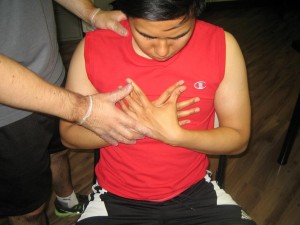Overview
Chest injury is any damage to the chest region, amid the neck and the stomach. The injury might be to the chest wall, or any of the structures inside the chest. Direct force to the chest can lead to a minor or severe injury. It is not uncommon to have the air whacked out of you and become short of breath.
Even after an injury to the chest, it is vital to conclude whether your pain may be the result of an underlying heart problem. If you done suspect any signs of an angina or a heart attack, your pain is possibly a result of your chest injury.
Chest injuries consist of:

- Bruising or scrapes (cuts and scratches) to the chest region.
- Cracked bones (for instance, the ribs).
- Damage to the heart or lungs.
Chest injuries which are minor such as bruising are quite frequent. Chest injuries might be caused by either:
- A direct injury from sport, or from a fall.
- A piercing wound, such as from a knife or gun.
- A crushing wound, such as from a car accident.
If the injury is serious, there might be internal blood loss. This may be noticeable (e.g. throwing up blood), or not so apparent (e.g. pale and sweaty skin, queasiness, extreme dehydration). If you think you might have internal blood loss, you should phone for the emergency services immediately.
Symptoms of Chest Injuries
Signs of chest injury can differ, depending on the kind of wound. The most frequent signs and symptoms are:
- Discomfort in the chest that is painful when sneezing or coughing.
- Trouble breathing.
- Sensitivity
- Bruising
- Inflammation
Treating A Chest Injury
If any section of your chest is bleeding, shield the area with a clean rag or bandage, and apply steady pressure to discontinue the bleeding. If you are in agony, take pain relievers. If you have a slight injury, try not to move around. Don’t lift, bend or do any vigorous exercises until your discomfort and other symptoms have disappeared. If you see that the color of the phlegm you cough up has altered, you should speak to you GP, as this might be an indication of a chest infection.
You should get assistance by going to an emergency department or phoning for an ambulance if:
- There are issues with your breathing.
- There is blood when you cough.
- You suspect that you might have internal blood loss.
Call your GP for guidance if:
- Your symptoms deteriorate.
- Additional symptoms start to form.
- You become gradually worried.
Related Video On Chest Injuries
https://www.youtube.com/watch?v=U2sBRr4uxGY
